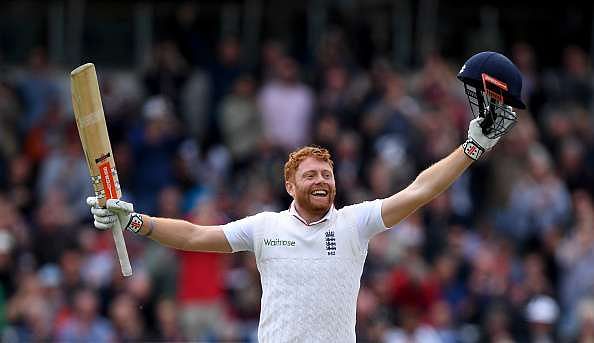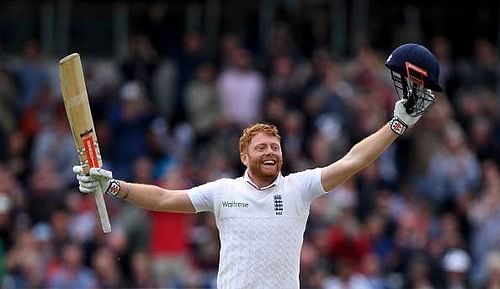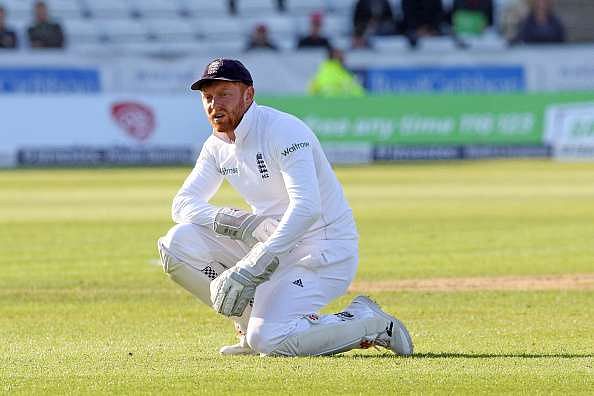
Analysing Jonny Bairstow's role in England's Test team

When you finish your last two Test series with a Man of the Series award and an England-record for the most dismissals by a wicketkeeper in a three-match series, you don't expect your position to be in jeopardy.
Unfortunately for Jonny Bairstow, his position is, not only because England's coach Trevor Bayliss is a "bit old school" but also because he missed four chances in the series against Sri Lanka, including an easy catch off Chris Woakes at Lord's and at least half a dozen chances in the series against the Proteas, where he was undoubtedly England's best batsman.
As a batsman, the 26-year-old from Yorkshire has done everything that he possibly could have done and then some more as well. But unfortunately for him, he is in the side as the wicketkeeper and as he hasn't done anywhere near as well in that regard, as a result of which, his position now comes under scrutiny.
Especially, after Bayliss said: "I am a little bit old school. I think the best wicketkeeper should be the wicketkeeper."
Before adding, "(Our wicketkeepers) are probably batters who are wicketkeepers. I've said to all three (Jos Buttler, Sam Billings and Jonny Bairstow) of them that I believe the wicketkeeper in the team should be the best we have.
"Personally I believe it is a wicketkeeping position. Ben Foakes is one name that has been mentioned, along with two or three others. From the selectors' point of view, it is something we are going to have to work through and think pretty carefully about."
Presenting Bairstow's case
If it is batting in the longest format of the game that is a yardstick for selection then there is no reason to remove the 26-year-old from the team. After he was picked in the England side in last year's Ashes on the back of an impressive showing in the County Championship, Bairstow's batting has gone on from strength to strength.
Although his career batting average of just under 40 doesn't exactly make for impressive reading, since his return to the side, he has been nothing short of phenomenal. In the 13 Tests since his comeback, he has scored 998 runs at an average of 67.66 and a strike rate in excess of 60.
While strike rates don't usually matter a great deal in Tests, the importance of Bairstow's strike rate is that his ability to counter-attack the bowling and score runs quickly has helped England either set a big total or gain crucial momentum in a game. His ability to bat with the tail as well, has been impressive.
When you just look at his stats from the current year, Bairstow's numbers look even more incredible. In the six Tests that he has played this year, he has three hundreds, including his career-best Test score of 167*, came incredibly close to beating Alec Stewart's record of highest score by an English wicketkeeper and has scored 626 runs at an average of 104.33.
In the recently concluded series against Sri Lanka, Bairstow (387) also broke the record for the most runs scored by an England batsman when batting at No.6 or lower in a three-match series, beating Matt Prior's record of 311 against New Zealand. In fact, in the history of Tests, only six batsmen have scored more than Bairstow did, with Adam Gilchrist's 473 against South Africa taking top spot.
Bairstow's troubles

If his numbers are so impressive with the bat, much more than any English keeper in the last decade, then why is his position in jeopardy, you ask? Well, that's because the reason has nothing to do with how well he is batting but with his work behind the stumps. And it is here that Bairstow fails.
Although Bairstow has played 27 Tests, he has kept wickets in just 10 of them, despite spending the vast majority of his career for Yorkshire batting in the middle-order and keeping wickets. While his batting improves when he has his pads on, an average of 59.8 as the keeper as opposed to 28.9 when he is not, tells one story, his keeping tells another.
While his batting has been outstanding of late, his tendency to drop simple catches might well prove to be his undoing. In his last two Test series, Bairstow has finished with a negative keeper rating according to the analytics company, CricViz.
In fact, his rating of -111 for the Sri Lanka speaks for how bad he was as Dinesh Chandimal got a -22 for the same series. In the series against the Proteas, Bairstow finished with a -28 rating, which was much morse than Quinton de Kock and Dane Vilas, who finished it with ratings of -21 and +41 respectively.
This is precisely why Foakes, who is only 23 but has already been described by former England keeper and Surrey's director of cricket, Alec Stewart as "the most talented keeper in the country" is in line for an England call-up after being invited to train with the national team on several occasions since his Lions call-up.
One of the reasons why Bairstow's position is in question is because of England's grueling winter schedule, which sees them play seven Tests in Asia, including a tour of India, where the keeper is expected to play a huge role on turning tracks. And despite his experience of keeping to Adil Rashid at Yorkshire, Bairstow hasn't done enough to guarantee his spot as the keeper in the side.
And that is precisely why England have a huge decision to make after completing another routine series victory. Do they take Bairstow to Asia despite his flaws and hope that he gets better or take a young and relatively inexperienced keeper in Foakes, who is no mug with the bat either, and expose him to the harsh reality of the international arena? As England prepare for another home series, against Pakistan, the future of who remains behind the stumps remains uncertain.